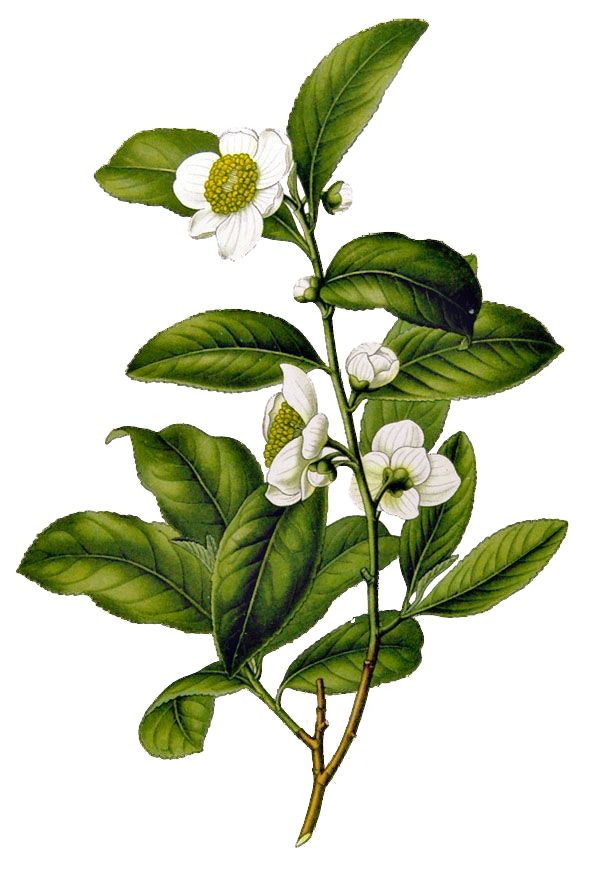


You‘ve been doing tasting tea all your life. First, discover the best brand that’s refreshingly unique by testing these features on your tea tasting journey; appearance, aroma, flavour and mouthfeel. It’s nothing else, Ceylon Tea, which is also known as Sri Lankan Tea. Ceylon Tea is a serious business brand in Sri Lanka. In over a hundred and fifty years, the trademark “Ceylon Tea” had become co-existent with the world’s finest tea. Why Ceylon Tea is different from other teas? It still follows the old-time style. It is raised by the tender care of Sri Lankan hands, the expert tea pluckers. From picking to distribution, the Sri Lankan workforce commits to bringing the finest to your cup. Ceylon Tea is an excellent brand for any drink recipe. You can flirt with new recipes like Tea lemonade, Chocolate tea, Tea punch, Tea sorbet, Tea wine, Milk tea, etc. Celebrated to be the most superior trademark in the world, Sri Lankan family tea companies make equal contributions to export the highest valued tea. After all, The logo ‘Ceylon Tea – Symbol of Quality’ is promoted as a global trademark to strengthen its quality and preserve the originality.
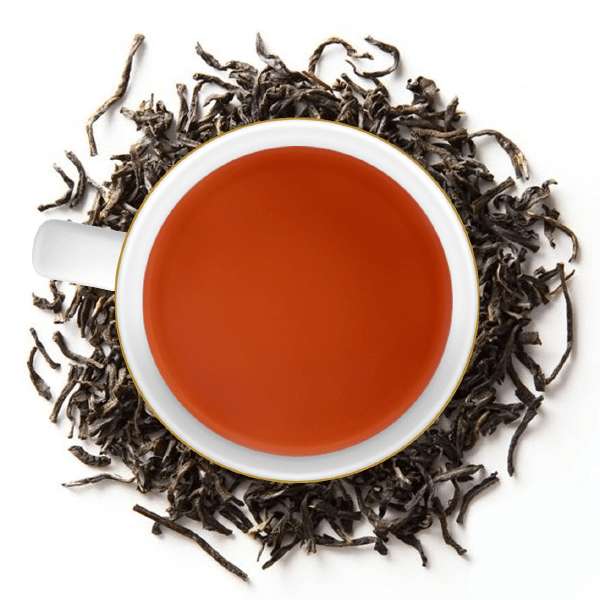
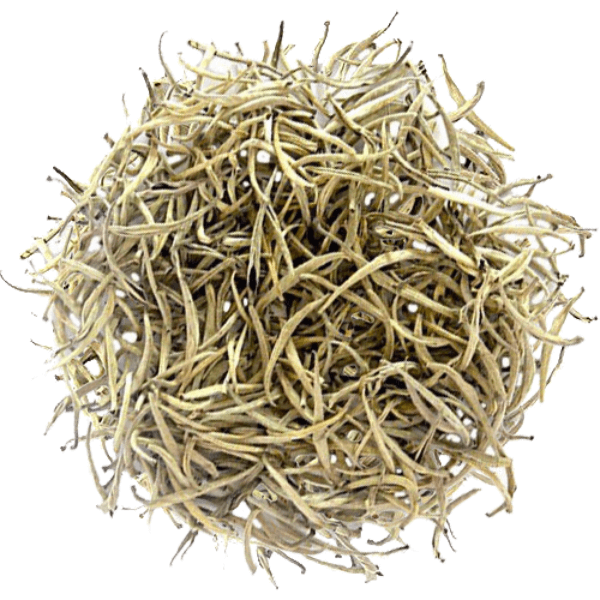
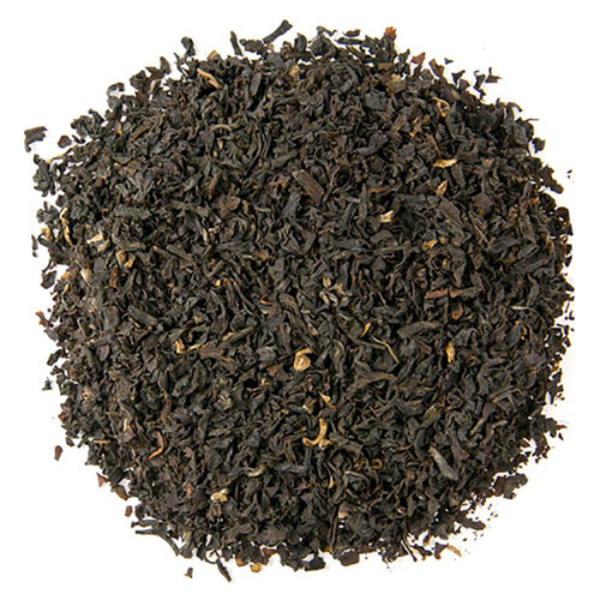
Ceylon Tea celebrated its 150 th anniversary in 2017 ensuring they are one of the best tea brands in the world after being a global trademark in 2010. When running to its past, the story of tea begins with the failure of growing coffee. Tea was first introduced to Sri Lanka in the 19th century by the British. The first tea plant was brought to Sri Lanka in 1824 as an ornamental plant for a botanical garden and planted in the Royal Botanical Gardens in Peradeniya, Kandy. As the first cultivation, James Taylor started a 19-acre tea plantation in Loolecondera estate, but he was not the first to try. In 1873, this new brand called Ceylon Tea gained popularity throughout the world. In the timeline 1824-1965, production grew significantly becoming Sri Lanka, the world’s largest tea exporter for the first time in 1965.
 Ceylon Tea – Symbol of Quality
Ceylon Tea – Symbol of QualityThe Ceylon Tea brand is demonstrated by the legendary lion of the Sri Lankan flag as the symbol of quality – “Lion with a Sword” logo. The “Lion with a Sword” logo, printed on each pack, shows not only the Sri Lankan identity but also is a guarantee for 100% pure Ceylon Tea.
Assam Tea is a particular type of black tea grown in the northeastern Indian state of Assam, Ceylon Tea, meanwhile, is the product of Sri Lanka. Assam Tea was in production before Ceylon Tea, but in the same century, 19 th. And the producers of Ceylon Tea consulted Assam Tea planters in order to learn how to propagate tea in Sri Lanka better. Both teas are amongst the most popular choices at the breakfast table. The flavour profile of Ceylon Tea depends on where the tea is grown. But it is generally thought to be bold, full, and brisk. Assam Tea is often used in tea blends and owns an earthy, malty flavour. There is a widespread history behind both Ceylon and Assam tea, as well as numerous health benefits to drinking them.
In Sri Lanka, there are seven agro-climatic areas where tea is grown, giving life to a product that stands out for its colour, flavor, aroma, taste and appearance. The tea plantations are spectacular, like those found in the Hill Country. The production is carried out with a manual harvest and an artisanal method that has remained unchanged for more than a century.
Sri Lankan tea is classified based on several factors, including leaf size and variety. The tea in powder is of a lower type, while those in leaves are considered better for obtaining a good infusion.
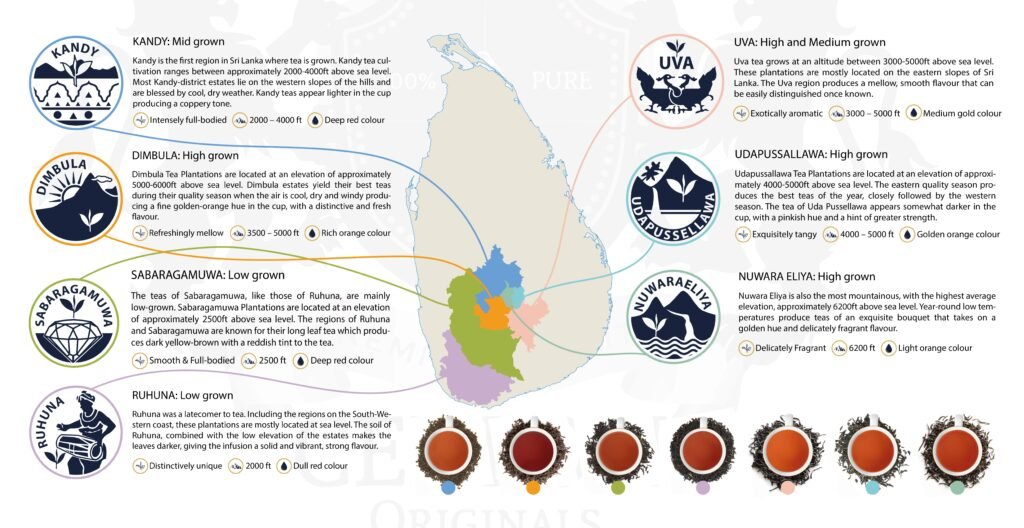
 Sabaragamuwa Tea: Low grown
Sabaragamuwa Tea: Low grownThe teas of Sabaragamuwa, like those of Ruhuna, are mainly low-grown. Sabaragamuwa Plantations are located at an elevation of approximately 2500ft above sea level. The regions of Ruhuna and Sabaragamuwa are known for their long leaf tea which produces dark yellow-brown with a reddish tint to the tea.
 Ruhuna Tea: Low grown
Ruhuna Tea: Low grownRuhuna was a latecomer to tea. Including the regions on the South-Western coast, these plantations are mostly located at sea level.The soil of Ruhuna, combined with the low elevation of the estates makes the leaves darker, giving the infusion a solid and vibrant,strong flavour..
 Kandy Tea: Mid grown
Kandy Tea: Mid grownKandy is the first region in Sri Lanka where tea is grown. Kandy tea cultivation ranges between approximately 2000-4000ft above sea level. Most Kandy-district estates lie on the western slopes of the hills and are blessed by cool, dry weather. Kandy teas appear lighter in the cup producing a coppery tone.
 Uva Tea: High and Medium grown
Uva Tea: High and Medium grownUva tea grows at an altitude between 3000-5000ft above sea level. These plantations are mostly located on the eastern slopes of Sri Lanka. The Uva region produces a mellow, smooth flavour that can be easily distinguished once known
 Dimbula Tea: High grown
Dimbula Tea: High grownDimbula Tea Plantations are located at an elevation of approximately 5000-6000ft above sea level. Dimbula estates yield their best teas during their quality season when the air is cool, dry and windy producing a fine golden-orange hue in the cup, with a distinctive and fresh flavour.
 Udapussallawa Tea: High grown
Udapussallawa Tea: High grownUdapussallawa Tea Plantations are located at an elevation of approximately 4000-5000ft above sea level. The eastern quality season produces the best teas of the year, closely followed by the western season. The tea of Uda Pussellawa appears somewhat darker in the cup, with a pinkish hue and a hint of greater strength.
 Nuwara Eliya Tea: High grown
Nuwara Eliya Tea: High grownNuwara Eliya is also the most mountainous, with the highest average elevation, approximately 6200ft above sea level. Year-round low temperatures produce teas of an exquisite bouquet that takes on a golden hue and delicately fragrant flavour.
Aside from being rich in several antioxidants, including myricetin, quercetin, and kaempferol Ceylon Tea is an extremely healthy beverage. It shapes your health providing impressive benefits.
Helps in Heart problems:Flavonoids present in tea can reduce the effects of several risk factors such as high cholesterol, high blood pressure, oxidative stress, inflammation, and diabetes preventing heart attacks and strokes.
Ceylon Tea for Cancer:Flavonoids present in Ceylon Tea reduce the risk of cancer initiation preventing the growth or development of cancerous cells.
For Weight loss:This only works with almost zero calories, without the addition of milk and sugar. Flavonoids in tea increase metabolism, thereby being able to digest and break down food and fats.
Ceylon Tea, an Immunity booster:Drinking Ceylon Tea can strengthen your immune system, due to the polyphenols and theanine present in tea preventing you from falling sick.
Ceylon Tea for Menopause relief:Ceylon tea may help fight your menopause symptoms and can be an effective way to strengthen bone metabolism and decrease the risk of bone fractures.
Increases your Energy levels:Caffeine can increase your energy levels. Ceylon Tea contains more caffeine than practically any other tea.
Ceylon Tea for Oral Health:The high levels of fluoride content in tea helps prevent cavities and plaque. And creates resistance for tooth decaying bacteria to exist.
Despite the huge demand for Ceylon Tea in the world market, we lose our appetite if we take any brand of tea in a large quantity. Besides, it is harmful to health if we take too much tea. The ideal would be to drink four cups of black tea a day. Try some sips on Ceylon tea for their science-backed benefits.
Copyright © 2024. All Rights Reserved.
Powered by Olutek Digital Solutions